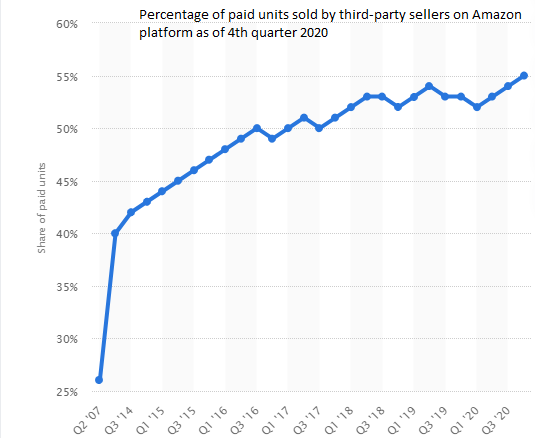The following is a contributed article from a content partner of Benzinga
Few if any Amazon AMZN customers wonder about the logistical and financial hurdles required for next-day or same-day delivery. Behind each transaction is a multi-billion dollar system that Amazon built from the ground-up since it first expanded beyond books in 1998.
The Financial Component: Amazon’s PSPP Program
Amazon is valued at more than $1.5 trillion and generated more than $125 billion in revenue during its fiscal fourth quarter in 2020. The leading e-commerce platform is home to millions of small and medium-sized businesses looking to leverage the Amazon platform to generate new sales.
Given its large size and global scale, Amazon is perhaps more vulnerable to fraud and theft than its smaller peers. To protect the integrity of its platform and the financial interests of itself, customers, and third-party sellers (3P), Amazon launched what it calls the Payment Service Provider Program, or PSPP.
According to data from Statista, Amazon generated $80.46 billion in third-party seller service revenues in 2020, representing a sharp uptick from $53.76 billion in the prior year.
The purpose of the PSPP, in Amazon's own words, is to “enhance our ability to detect, prevent, and take actions” against bad actors and to reduce cases of fraud and abuse. As such, all 3P sellers on Amazon’s platform must transact with an authorized payment service provider that participates in the PSPP.
There is nothing unusual or odd with Amazon’s policies. Given a large number of financial institutions worldwide, Amazon simply prefers to verify and trust a small number of institutions to lower the potential for fraud.
Amazon is constantly adding new institutions that are authorized to transact with Amazon sellers. Some of the more recognizable names include:
- AirWallex.
- Global Pay
- OFX Global Currency.
- Payoneer
- Skyee
Amazon’s Changes to PSPP In 2021
Amazon announced on Feb. 1, 2021, new rules related to its PSPP program. Sellers that are not doing business with one of the authorized institutions must switch to a participating provider before May 31, 2021.
Sellers who do not make the necessary adjustments in time will not have timely access to their funds. A small grace period until July 15 will give sellers extra time to make the change. At that point, Amazon will stop disbursements to sellers that continue to transact with a non-participating institution. Amazon does note an exception can be made for sellers using their local deposit-taking bank.
It goes without saying that selling on Amazon’s platform is a right and can be subject to changes at any notice. Sellers that no longer agree to Amazon’s terms will lose their right to sell on the platform.
Privacy Update: Data Sharing
One of the terms and conditions that sellers must agree to has a private information component. According to Amazon’s website:
Amazon shares with Participating PSPs the PSP account number you provided to us and information about your Amazon selling account in order to verify that your bank account is issued by a Participating PSP and to protect against fraud and abuse. Participating PSPs also share with Amazon information about your identity and your PSP account [emphasis added]. If your Selling on Amazon account is deactivated or terminated due to abuse, fraud, or illegal activity, Amazon will receive additional information about your PSP account, including limited transaction information. Amazon uses information provided by Participating PSPs only to identify and take actions against individuals who engage in abuse, fraud, or other illegal activity.
The company notes it does so to protect itself from repeat instances of fraud. If necessary it will take legal action to recoup financial damages it incurred as the result of fraud.
Amazon does have a long history of hoarding data for itself and not sharing data with others. For example, The Wall Street Journal reported how Amazon leverages data from its own third-party sellers to identify selling patterns or trends that would justify its own expansion into new private-label product lines.
Wal-Mart WMT asked some of its tech vendors that they can’t use Amazon’s cloud operator, AWS. Wal-Mart is concerned that some of its own sensitive data is stored at the cloud unit that is owned by its largest rival, Amazon.
There is no reason to conclude that Amazon is actively spying on Walmart by default of the data stored in its cloud business. But if it did so, it might not come as a surprise.
After all, US House Democrats said in a 400-page report in 2020 that Amazon boasts “significant and durable market power” and it has the “incentive and ability to exploit” conflicts of interests to protect its competitive standing. However, Amazon has never been credibly accused of engaging in illegal trade activity.
Conclusion: Amazon Has Its Flaws, But These Are Well Understood
Amazon’s 3P business has certainly created several millionaires selling a product at a level they just couldn’t do on their own. Naturally, Amazon needs to be compensated for the billions of dollars it invested to ensure the success of its sellers.
Needless to say, third-party sellers are a vital component of Amazon’s growth plans. As such, Amazon has every interest in creating a platform that is welcoming to its third-party sellers. This is especially true after retail rival Walmart teamed up with Shopify in 2020 to better position themselves to challenge Amazon’s online dominance.
But at the same time doing business on Amazon’s platform comes with drawbacks related to private information as well as business risk. Armed with all the information possible across the internet, third-party sellers and vendors must be trusted to make decisions that are right for themselves.
© 2025 Benzinga.com. Benzinga does not provide investment advice. All rights reserved.
Trade confidently with insights and alerts from analyst ratings, free reports and breaking news that affects the stocks you care about.
